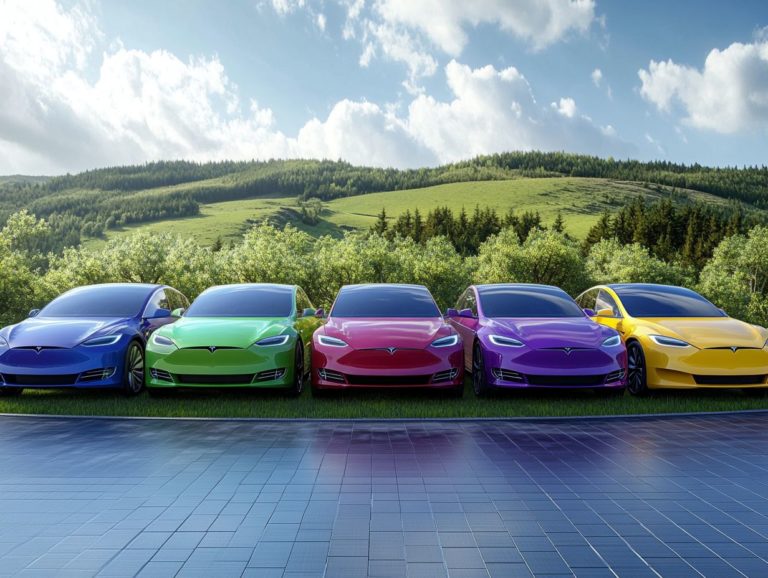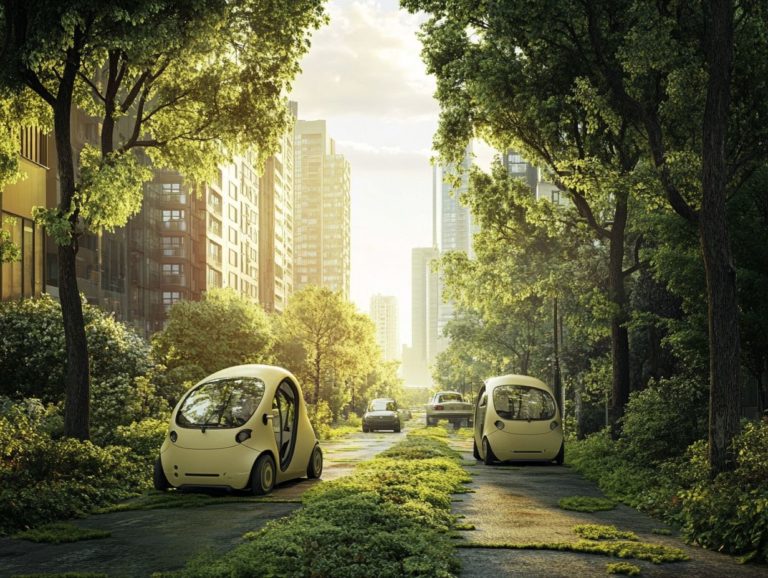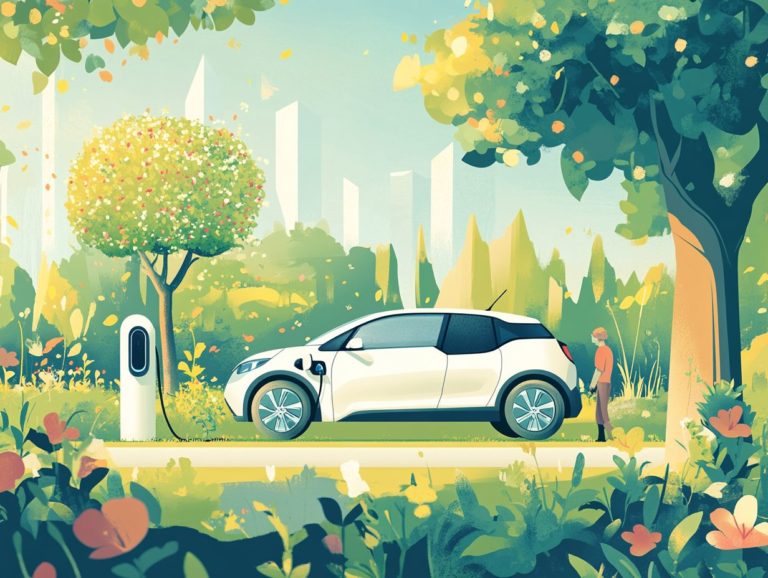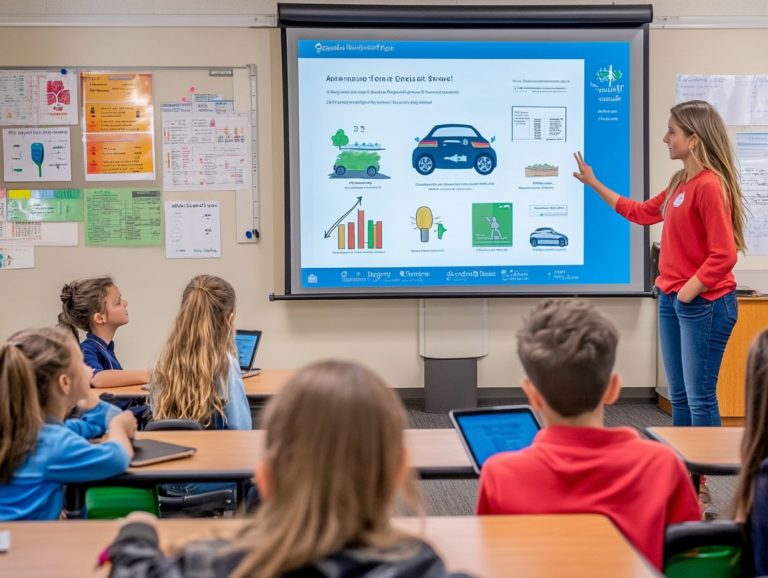EVs and Their Contribution to Green Jobs
Electric vehicles (EVs) represent more than just a fleeting trend; they embody a crucial shift toward sustainability.
As their popularity surges, their influence on the environment and the job market becomes increasingly profound. Let s explore how EVs are changing our world for the better!
You ll discover the government incentives that bolster this transition, along with the challenges and solutions needed to unlock the full potential of EVs and green jobs. Join in as you explore the benefits and implications of this electric revolution.
Contents
Key Takeaways:

- EVs are vehicles that run on electricity instead of gasoline, reducing emissions and preserving natural resources for a cleaner environment.
- The rise of EVs has led to the creation of green jobs in the industry, providing opportunities for employment and promoting sustainable practices.
- Government incentives and support for EVs and green jobs are crucial for their continued growth and success, addressing challenges such as infrastructure and training needs.
What are EVs?
Electric Vehicles (EVs) are revolutionizing the automotive landscape by using advanced battery technology to power electric motors instead of relying on traditional gas engines. These vehicles not only offer remarkable energy efficiency and reduced emissions but also represent a crucial stride toward environmental sustainability and the fight against climate change.
The surge in electric cars, fueled by breakthroughs in battery technology and a growing network of charging stations, is transforming how urban planners envision transportation and infrastructure.
With electric motors delivering instant torque the force that helps a vehicle move and a smoother driving experience, it s no surprise that interest in EVs is on the rise. By 2022, global EV sales soared past 6 million units, showcasing a powerful trend that major manufacturers like General Motors and Volkswagen are eagerly tapping into.
Innovations in lithium-ion battery technology, which are rechargeable batteries commonly used in devices like smartphones, have dramatically enhanced range and slashed charging times, leading to remarkable advancements in the industry.
As governments roll out incentives and policies to promote electric mobility, the path to widespread adoption of these vehicles becomes increasingly clear, paving the way for a sustainable future that you can be a part of.
Benefits of EVs for the Environment
Electric vehicles offer an impressive array of benefits for the environment, playing a pivotal role in reducing greenhouse gas emissions an essential strategy in the battle against climate change.
By complying with rigorous emissions standards, EVs actively contribute to pollution control and foster cleaner air in urban settings, enhancing overall environmental sustainability.
Embracing electric cars also speeds up the development of clean energy sources, positioning them as a crucial element in the broader transition to renewable energy.
Reducing Emissions and Pollution
One of the most significant advantages of electric vehicles lies in their remarkable ability to reduce emissions and pollution, especially in bustling urban areas where air quality concerns have reached critical levels. By predominantly running on clean energy, electric vehicles are engineered to meet and often surpass current emissions standards, playing a crucial role in pollution control and the overall health of communities.
As the electric vehicle industry continues to evolve, so does its positive impact on the environment, paving the way for a more sustainable automotive landscape.
This evolution aligns seamlessly with regulations such as the Clean Air Act and California’s rigorous zero-emission vehicle (ZEV) mandates, designed to cut down greenhouse gas emissions and harmful pollutants. When you embrace electric vehicles, you contribute to a decline in nitrogen oxides and particulate matter both are linked to respiratory issues and various health challenges.
The ripple effect of cleaner air is particularly impactful for low-income communities, where advocates for environmental justice underscore the need for equitable access to cleaner transportation options. Ultimately, this shift enhances public health and emphasizes a shared commitment to sustainability and a greener future.
Join the movement towards a more sustainable future by considering an electric vehicle today!
Preserving Natural Resources
The transition to electric vehicles presents you with a remarkable opportunity to preserve natural resources. This is particularly important through the sustainable management of materials used in electric batteries.
With a growing emphasis on battery recycling and renewable energy sources, the EV industry strives not only to minimize its environmental footprint but also to foster a system where materials are reused that benefits both the planet and the economy.
By investing in sustainable materials and production techniques, you can help ensure the longevity and efficiency of electric vehicles while protecting essential natural resources.
This approach significantly reduces waste and enhances overall resource efficiency. Incorporating recycled materials into the production of new batteries lowers the demand for mining and extraction, which harms ecosystems and depletes finite resources.
As the industry evolves, the focus on innovative recycling methods, along with the adoption of bio-based or recyclable components, underscores a commitment to sustainability that promises long-term benefits.
These practices pave the way for a more resilient EV sector one that harmonizes economic growth with environmental stewardship for future generations.
Impact of EVs on Job Creation

The rise of electric vehicles is not merely reshaping the automotive industry; it is also generating a wealth of job opportunities across a spectrum of sectors, profoundly influencing job creation and workforce development.
As the demand for electric cars escalates, so too does the necessity for skilled professionals in fields like manufacturing, electrical engineering, and battery technology. The emergence of green jobs tied to the EV industry promises not just economic growth but also community advantages, particularly highlighted in discussions about why EVs are crucial for a sustainable future, all while tackling global unemployment challenges through targeted training and educational initiatives.
It’s crucial to act now and consider a career in this exciting, growing market!
Overview of Green Jobs
Green jobs, particularly those emerging from the electric vehicle industry, shine with their commitment to environmental sustainability and exceptional job quality. They provide you with a sense of purpose and stability in a rapidly evolving job market. These roles encompass various disciplines, ranging from manufacturing electric vehicles to developing cutting-edge battery technology and investing in infrastructure for charging networks, all contributing to a cleaner economy. For more insights, check out how EVs promote clean energy usage.
Exciting labor statistics show a booming demand for these positions, which increases your job security in the EV sector, ushering in a new era of employment opportunities.
This sector not only fosters economic resilience but also aligns seamlessly with global sustainability goals, significantly reducing greenhouse gas emissions and promoting a system where materials are reused. The demand for roles such as electric vehicle technicians, battery engineers, and sustainability consultants is on the rise, reflecting a trend toward high-quality job creation.
Numerous initiatives, including government programs and partnerships with educational institutions, focus on workforce development. This ensures that you and others are well-prepared to meet the demands of this burgeoning field, solidifying the EV industry s crucial role in the fight against climate change.
Current and Potential Job Opportunities in the EV Industry
The electric vehicle industry is booming, presenting a wealth of current and potential job opportunities tailored to a variety of skill sets and interests. Whether you re eyeing manufacturing roles or engineering positions focused on battery technology, there s something for everyone.
As the electric vehicle market expands, so does the demand for skilled workers like you, capable of driving innovation in production techniques and enhancing energy efficiency. This evolution fuels job growth within the industry and aligns perfectly with the broader shift toward cleaner transportation solutions, including how EVs are contributing to smart cities.
Take note of roles such as:
- Electrical engineers who design cutting-edge power systems,
- Automotive assembly workers who uphold quality standards in vehicle production, and
- Construction workers who build the essential charging infrastructure.
Industry projections suggest that the number of EV-related jobs could surpass one million by 2030, spurred by an anticipated rise in electric vehicle sales that may capture 30% of the global market share.
This surge is a golden opportunity for professionals! It s also a compelling incentive for students pursuing STEM fields, allowing them to engage in a transformative industry that emphasizes sustainability and innovation.
Government Incentives for EVs and Green Jobs
Government incentives are pivotal in driving the swift adoption of electric vehicles and fostering the emergence of green jobs. Significant measures have been introduced through policies such as the Bipartisan Infrastructure Law and the Inflation Reduction Act.
These incentives stimulate economic growth and encourage sustainable investments that lay the groundwork for a robust electric vehicle industry. By facilitating the integration of electric vehicles into the mainstream market, these initiatives create a positive feedback loop, resulting in both job creation and environmental benefits that resonate across communities.
Supporting the Growth of EVs and Green Jobs
Supporting the growth of electric vehicles and green jobs demands a variety of methods, including advocating for government incentives to boost job creation and enhance workforce development, particularly in areas that highlight the connection between EVs and sustainable living.
By championing investment in training programs and educational resources, you can help prepare the workforce for the evolving demands of the EV industry while ensuring that job quality remains a priority. This strategic support contributes to combating climate change while fostering economic stability and community benefits.
Your involvement can make a difference! When the government supports initiatives promoting electric vehicle adoption and green job creation, it cultivates awareness and enthusiasm within your community.
By collaborating with educational institutions and local organizations, you can help create a robust ecosystem that encourages participation from diverse groups. Through hands-on training, workshops, and public outreach, individuals will gain the necessary skills while developing a sense of ownership and responsibility towards sustainability.
As these initiatives take root, they lay the groundwork for a greener future, proving that community involvement is essential for the long-term success of the EV industry.
Challenges and Solutions for EVs and Green Jobs

Despite the bright future that electric vehicles and green jobs promise, you must navigate several challenges to ensure a seamless transition in the job market and infrastructure investments.
Key issues to consider include the expansion of charging networks, the development of training and education programs tailored to the evolving needs of the EV industry, and strategies to tackle potential workforce shortages.
By acknowledging and addressing these challenges head-on, you can play a crucial role in facilitating the energy transition, securing job opportunities, and minimizing disruptions in the automotive sector.
Your proactive involvement is vital for the long-term success of the EV industry!
Addressing Infrastructure Needs
Addressing infrastructure needs is crucial for your successful integration of electric vehicles into everyday life. Building electric charging stations is vital! This highlights the importance of establishing electric charging stations and a comprehensive electric charging network.
As urban planners and policymakers focus on infrastructure investment, they can create job opportunities related to the installation and maintenance of charging stations. This enhances community benefits and promotes environmental sustainability.
Developing a robust electric charging network is essential, providing you with greater accessibility and convenience. This encourages the adoption of electric vehicles in both urban and rural areas. Communities equipped with ample charging facilities not only attract electric vehicle owners but also stimulate local economies through job creation in the green technology sector.
Such infrastructure enhancements foster a sense of readiness within communities, ultimately leading to increased public awareness and acceptance of electric vehicles as a viable alternative to traditional gasoline-powered cars.
Training and Education for Green Jobs
Training and education play a pivotal role in creating green jobs and ensuring you are well-equipped to meet the demands of the rapidly evolving electric vehicle industry. Understanding the relationship between EVs and renewable energy is crucial. By implementing tailored educational programs, companies and institutions can enhance job quality and security while preparing you for specialized roles in manufacturing, engineering, and infrastructure development.
This emphasis on workforce development not only supports the growth of electric vehicle jobs but also contributes to long-term economic stability and environmental sustainability.
To effectively bridge the skills gap, various initiatives have emerged, including partnerships between educational institutions and industry leaders. These collaborations aim to create curricula designed specifically for the electric vehicle sector, focusing on both the technical skills and interpersonal skills, such as teamwork and communication that are essential for adaptability in the workplace.
Certifications and online training modules have gained popularity, empowering you to upskill and remain competitive in your field. Such proactive measures not only enhance your career prospects but also ensure that the workforce is robust enough to meet the demands of an ever-changing job landscape.
Watch this video to learn more about electric vehicles and their impact!
Frequently Asked Questions
What are EVs and how do they contribute to green jobs?
EVs, or electric vehicles, are powered by electricity instead of gasoline. They help create green jobs by reducing carbon emissions and contributing to sustainable cities through the promotion of jobs in the renewable energy sector.
How do EVs help reduce carbon emissions?
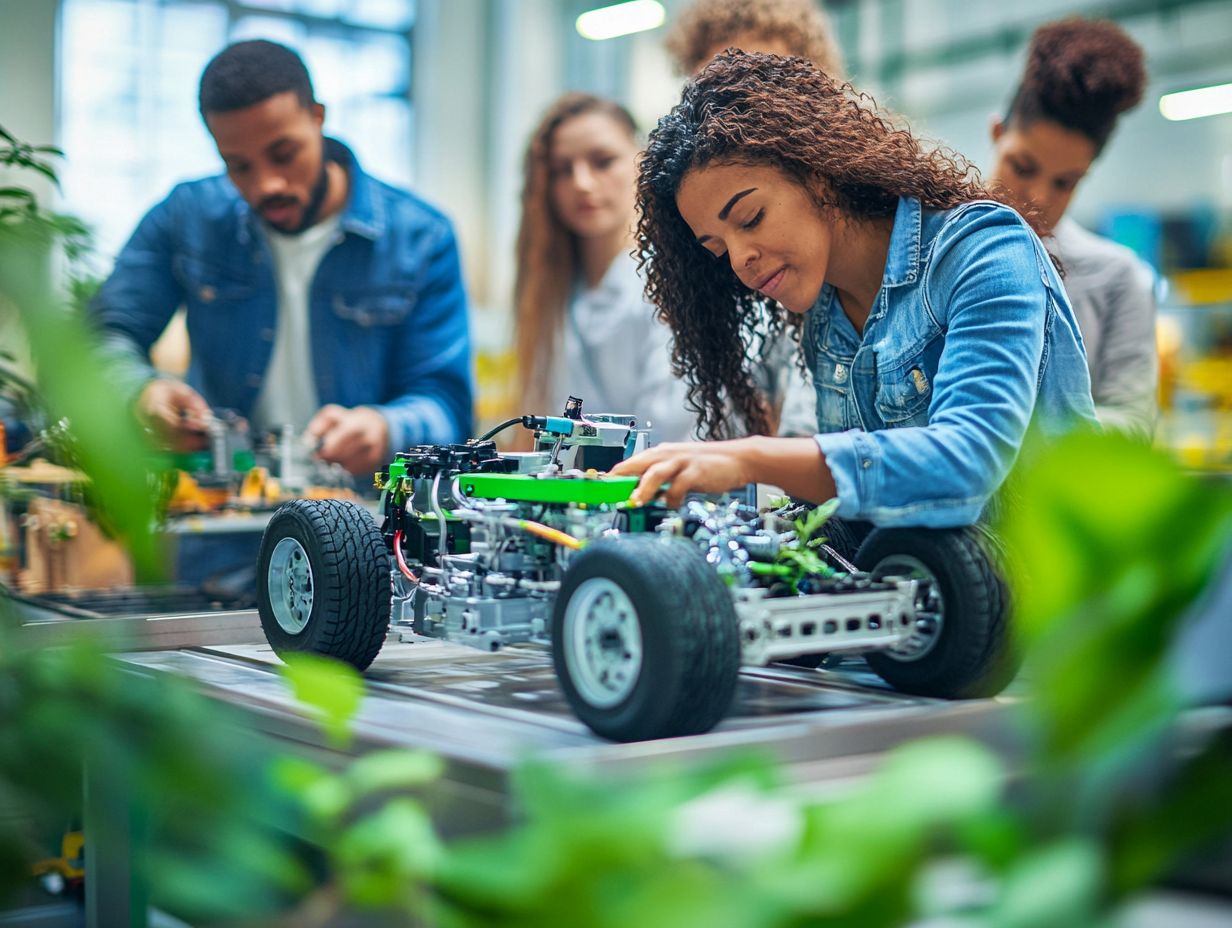
EVs release significantly less carbon emissions compared to traditional gasoline-powered vehicles. By using electricity as their fuel source, they contribute to lowering greenhouse gas emissions and help combat climate change.
What types of green jobs are created by the EV industry?
The EV industry creates a variety of green jobs, including manufacturing of EVs and their components, installation and maintenance of charging infrastructure, and renewable energy production for powering EVs. Understanding the impact of electric vehicles on the job market is crucial for those interested in this evolving field.
What are the environmental benefits of EVs?
EVs produce zero tailpipe emissions, reducing air pollution and improving air quality. They also help decrease dependence on fossil fuels and promote the use of renewable energy sources.
How do EVs contribute to energy independence?
By using electricity as their fuel source, EVs reduce reliance on imported oil and promote energy independence. This also helps to stabilize energy prices and decrease vulnerability to oil price fluctuations.
Are there economic benefits to transitioning to EVs?
Yes, transitioning to EVs can create new job opportunities in the renewable energy sector, reduce healthcare costs associated with air pollution, and save money on fuel costs for both individuals and businesses, playing a crucial part in combating climate change.
Join the movement towards sustainability today!

